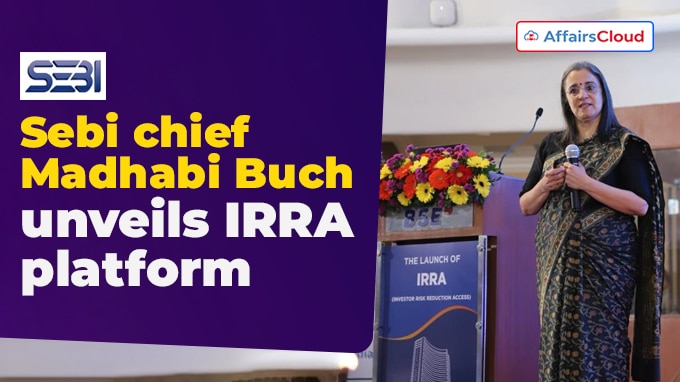 Madhabi Puri Buch, the Chairperson of the Securities and Exchange Board of India (SEBI), has officially launched the Investor Risk Reduction Access (IRRA) platform at the Bombay Stock Exchange (BSE).
Madhabi Puri Buch, the Chairperson of the Securities and Exchange Board of India (SEBI), has officially launched the Investor Risk Reduction Access (IRRA) platform at the Bombay Stock Exchange (BSE).
The IRRA platform, initiated by Market Infrastructure Institutions (MIIs) under SEBI’s guidance, aims to reduce risks faced by investors in the event of technical glitches at Trading Member (TM) ends, both at the Primary and Disaster Recovery sites.
Key Points:
i.The soft launch of the IRRA platform took place on October 3, 2023, with official launch occurring on November 20, 2023 for the benefit of investors.
ii.This platform is specifically designed for trading members supporting Internet-based trading (IBT) and Security Trading through Wireless Technology (STWT) for their investors.
- However, it is important to note that IRRA is not available for algo trading and institutional clients.
iii.In the event of a technical glitch impacting a TM’s ability to serve clients across exchanges from both primary and disaster recovery sites, TMs can invoke IRRA.
- Upon invocation, the platform downloads trades of the TM from all trading venues and sends SMS/email notifications to investors using internet trading or wireless technology.
- These notifications include a link to access the IRRA platform, allowing investors to review the status of their investments, orders, and place orders for squaring off or closing positions.
iv.The main goal of the IRRA platform is to safeguard investors’ funds and ensure their positions are protected.
About IRRA:
i.The Investor Risk Reduction Access platform (IRRA) is a platform jointly developed by all the stock exchanges –BSE, National Stock Exchange (NSE), National Commodity and Derivatives Exchange Limited (NCDEX), Multi Commodity Exchange (MCX) and Metropolitan Stock Exchange of India (MSE)
- IRRA is a cloud based platform connecting to all stock exchanges which will brought up on daily basis in a dormant state.
ii.IRRA platform will be available in case of disruption of trading services provided by Trading Member (TM). Its purpose is to provide investors with an opportunity to square off/close their open positions and cancel pending orders using the IRRA platform in case of technical glitches or unforeseen outages that render the Trading Member’s site inaccessible.
Trading Members: A trading member or a stock broker is a member of a stock exchange and can provide securities trading facilities to investors. TM can be an individual or a partnership firm or a company
SEBI Eases Regulations for Holders of Physical Securities Without PAN and KYC Detail
The Securities and Exchange Board of India (Sebi), the capital markets regulator, announced the elimination of the requirement to freeze folios lacking PAN, KYC details, and nominations for all holders of physical securities.
This regulatory change, designed to simplify procedures, will be implemented immediately, according to a circular from Sebi. The decision follows input from the Registrars’ Association of India and investors.
Key Points:
i.Previously, a mandate was in place for all holders of physical securities in listed companies to provide PAN, nomination, contact details, bank account information, and specimen signatures for their respective folio numbers.
- Under the previous rule, folios lacking any of these documents on or after October 1, 2023, were slated to be frozen by Registrars to an Issue and Share Transfer Agents (RTA), as outlined by Sebi in May. In an amendment to the May circular, Sebi noted the removal of the term ‘freezing/frozen.’
ii.Sebi’s decision to revoke these provisions comes in response to feedback from the Registrars’ Association of India and investors, aiming to address unintended challenges associated with the freezing of folios.
- The previous requirement for frozen folios to be reported to the administering authority under the Benami Transactions (Prohibitions) Act, 1988, and/or Prevention of Money Laundering Act, 2002, if they remained frozen as of December 31, 2025, has also been eliminated.
SEBI Grants Approval to Unifi Capital for the Launch of Mutual Fund Business
Portfolio management firm Unifi Capital announced that it has received in-principle approval from the capital markets regulator, Sebi, to establish a mutual fund house. The company had submitted an application to Sebi in December 2020 seeking a mutual fund license.
Unifi Capital, based in Chennai, stated that it has obtained Sebi’s in-principle approval to initiate its mutual fund business.
- Founded in 2001 as a registered portfolio manager, Unifi Capital is an employee-owned and managed firm that currently manages over ₹20,000 crore on behalf of approximately 10,000 Portfolio Management Services and Alternative Investment Fund clients across 22 states in India.
As of October-end, there are 45 mutual fund houses managing around ₹46.72 lakh crore in assets. Unifi Capital, with its team of 115 and expertise in research and operational precision, is poised to navigate market cycles for clients based on their understanding of market behavior.
Founder of Unifi: K Sarath Reddy
Guidelines to Initiate a Mutual Fund Business:
i.Sponsor Eligibility Criteria: The sponsor should have a sound track record and general reputation of fairness and integrity in all business transactions.
Sound track record includes:
- Business operation in financial services for a period of at least five years.
- Positive net worth in all the immediately preceding five years.
ii.Alternative Requirements if Sponsor Criteria Not Met:
- Adequate capitalization of the asset management company (net worth not less than rupees 150 crore).
- Lock-in of initial shareholding equivalent to capital contributed for a period of 5 years.
- Appointment of experienced personnel in the asset management company.
iii.Sponsor Contribution:
- The sponsor must contribute at least 40% to the net worth of the asset management company.
- Any person holding 40% or more of the net worth is deemed a sponsor.
About SEBI:
Formed: April 12, 1988
Headquarters: Mumbai, Maharashtra
Chairperson: Madhabi Puri Buch




